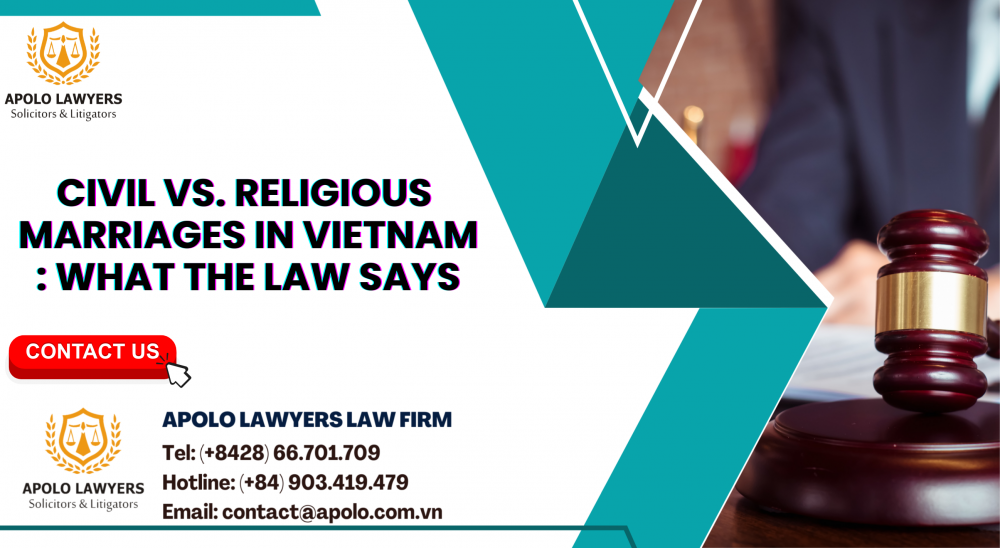If you are planning on getting married in Vietnam, it is essential to understand the difference between civil and religious marriages under Vietnamese law. Many couples—especially those in intercultural relationships—assume that a religious ceremony automatically grants them legal marital status. However, in Vietnam, the law draws a clear line between symbolic religious unions and legally recognized civil marriages. This article will explain how each type works, their legal implications, and how you can ensure your marriage is valid both in Vietnam and abroad. In case you need advice, please contact Apolo Lawyers via email at contact@apolo.com.vn or Hotline (+84) 903 419 479 for the best advice and support.
In Vietnam, a civil marriage is the only form of marriage that is officially recognized by law. This means that the marriage must be registered at the local People Committee, where both parties sign the marriage certificate in front of a civil registrar. Only after this step will your marriage be considered legal in the eyes of the state.
For foreigners getting married in Vietnam, this requirement applies equally—whether you are marrying a Vietnamese citizen or another foreigner. Without civil registration, your marriage will not have any legal standing in Vietnam, which can impact property rights, inheritance, and other legal matters.

Civil vs. Religious Marriages in Vietnam: What the Law Says
Vietnamese law allows couples to have religious ceremonies—such as weddings in churches, temples, or other places of worship—but these are purely symbolic. They carry cultural and spiritual significance but do not replace the need for civil registration.
Many couples choose to hold both ceremonies: a civil registration to meet the legal requirements, and a religious or cultural celebration to honor family traditions. However, relying solely on a religious wedding without registering civilly means you are not legally married in Vietnam, regardless of how elaborate the celebration is.
If you skip the civil marriage process and only have a religious ceremony, you could face several legal issues, including:
Your marriage will not be recognized by Vietnamese law.
You may be considered single for legal purposes, affecting property and inheritance rights.
Any children born from the union may face additional administrative steps for legal recognition of parentage.
Foreign embassies and consulates may not recognize the marriage for immigration or visa purposes.
For foreigners getting married in Vietnam, this can cause serious problems if you intend to apply for spousal visas, residency rights, or legal benefits tied to marital status.
In practice, many Vietnamese couples choose to complete the civil registration first, followed by a religious or cultural ceremony. This approach ensures legal compliance while respecting cultural or spiritual values. Some even hold the two events on the same day, starting with the civil signing in the morning and the religious celebration later in the day.
For international couples getting married in Vietnam, this two-step process is often the most practical and safest approach—allowing them to fulfill all legal obligations while also celebrating in a way that feels personally meaningful.
 Civil vs. Religious Marriages in Vietnam: What the Law Says
Civil vs. Religious Marriages in Vietnam: What the Law Says
Apolo Lawyers offers a comprehensive range of legal services for couples planning on getting married in Vietnam, including:
Guidance on the difference between civil and religious marriages and their legal effects.
Full assistance with the civil marriage registration process.
Document preparation, authentication, and translation services.
Legal consultation on cross-border marriage recognition.
Representation before local authorities to ensure smooth and timely registration.
Advice on structuring your wedding plans to meet both legal and cultural needs.
With Apolo Lawyers support, you can confidently navigate Vietnam marriage laws, ensuring your union is both meaningful and legally recognized.
If you are a foreigner living or investing in Vietnam and need legal guidance, do not hesitate to contact Apolo Lawyers – Solicitors & Litigators for professional support and peace of mind. If you still have any questions, do not hesitate to contact Apolo Lawyers – Solicitors & Litigators. Hotline: (+84) 903. 419. 479 and Email contact@apolo.com.vn to be supported and helped in the most optimal way.
>>> Read more: How to Replace a Lost or Damaged Vietnam Temporary Residence Card
>>> Read more: Renewing a Vietnam Temporary Residence Card: Procedures, Deadlines, and Common Mistakes
APOLO LAWYERS
